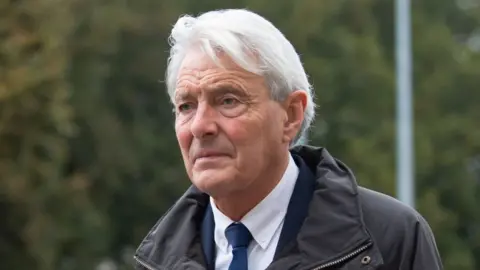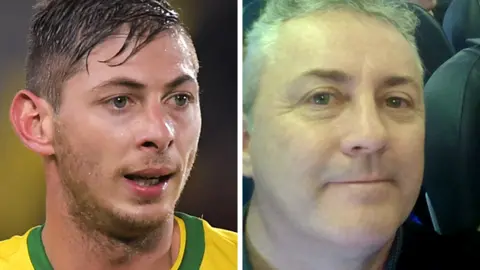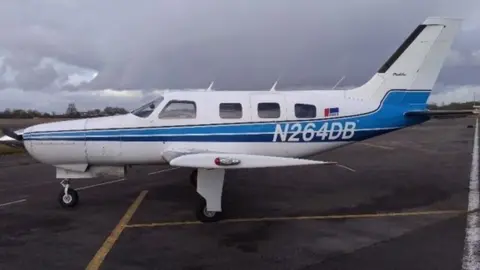Emiliano Sala: Flight organiser created risk and cut corners, court told
 Getty Images
Getty ImagesThe organiser of a flight that killed footballer Emiliano Sala "created risk" by cutting corners to suit his business, a jury heard.
Martin Goudie QC, prosecuting, told Cardiff Crown Court that David Henderson "lied" and blamed the pilot.
The case, he said, highlighted "breach after breach, all known about and all encouraged by Mr Henderson".
Plane operator Mr Henderson, 67, of Hotham, East Riding, Yorkshire, denies endangering an aircraft's safety.
Argentine striker Sala, 28, and pilot David Ibbotson, 59, died after their single-engine Piper Malibu plunged into the English Channel on a flight between Cardiff and Nantes in January 2019, set up by Henderson with football agent William "Willie" McKay.
The footballer was involved in a multimillion-pound transfer to Cardiff City from Nantes and was travelling between the two clubs at the time of his death.
 Getty Images/David Ibbotson
Getty Images/David IbbotsonIn his closing speech Mr Goudie said Mr Henderson "cut corners where it suited his business and when doing so, he created risk".
"The most basic checks did not take place," he said. "There was no paperwork, not even that of next of kin details.
"And, of course there are no records, because there wouldn't be if you knew the pilot you were hiring was not qualified.
"What he did here was not an accident. What he did here, we say, was deliberate and reckless."
He added: "This was an incompetent, undocumented, risk-creating and dishonest organisation."
'Through gritted teeth'
The court heard he hired Mr Ibbotson while being aware did not hold a commercial pilot's licence, was not allowed to fly at night, and whose rating to fly the single-engine Piper Malibu had expired.
Mr Goudie said while Mr Henderson accepted he was the flight's operator he did so "through gritted teeth".
The court was told while Mr Ibbotson had 3,500 flying hours, Mr Henderson could not say how many were "parachute hours". That refers to flights taking people parachuting.
Mr Goudie told the jury that would mean taking off in good weather and returning to the same airfield.
That was a "different type of flying" to the flight Sala and the pilot died in, said Mr Goudie.
Stephen Spence QC, defending, argued his client's oversights were "purely a paperwork issue" and that while Henderson had not followed regulations that had not led to a real risk of danger.
Mr Ibbotson was an experienced pilot with more than 3,500 hours flying, and legally it was his responsibility to ensure a safe flight, Mr Spence told the jury.
He told the court the only difference between a commercial licence and the private licence held by Mr Ibbotson was whether you could carry passengers for money or not, and not about ability.
The same, he claimed, was true of an Air Operator Certificate (AOC), which Henderson did not have and meant he was unauthorised to take cash for trips.
 PA/AAIB
PA/AAIBHe added of the prosecution case: "My learned friend said this is all down to Mr Henderson as the operator.
"No. Because it's a matter of law that the responsibility for the safe conduct of a flight is vested with the pilot."
Mr Spence implored the jury to treat his client fairly, saying: "He's 67 years old, a family man, father, grandfather, married over 30 years, former RAF officer, businessman, pilot with over 11,000 flying hours.
"In many respects, he is like any one of you."
Mr Henderson has admitted trying to arrange a flight for a passenger without permission or authorisation.
The case continues.
